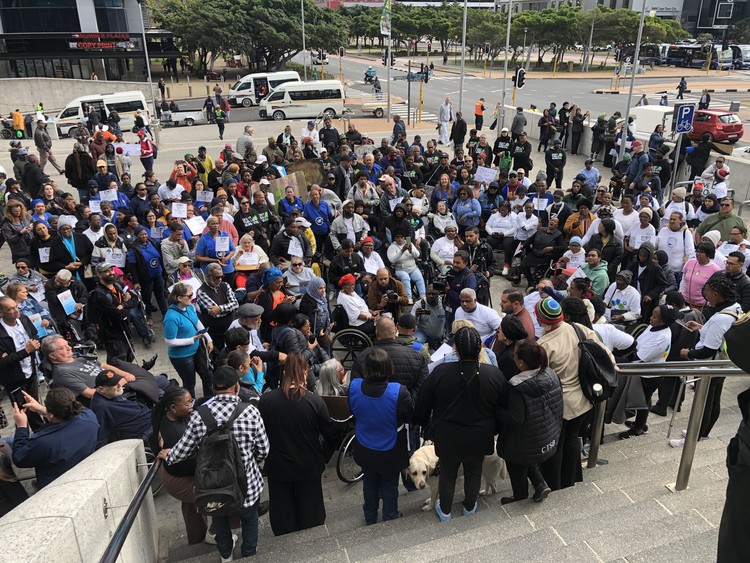
5 September 2025
A protest outside the Civic Centre in Cape Town in August after the announcement that the Dial-a-Ride service would be cut back. Archive photo: Mary-Anne Gontsana
The City of Cape Town has paused its plans to significantly cut back on its Dial-a-Ride service for disabled people.
The municipality reached a settlement agreement with the Western Cape Network on Disability on Friday, which was made an order of court by Acting Judge Wallis Roux. The network was represented by the People’s Legal Centre.
Last month, the City of Cape Town announced that from 8 September, people with visual and cognitive impairments, elderly people, and organisations would no longer be accommodated by the Dial-A-Ride service. Only wheelchair users and people with severe walking disabilities would be able to use the service, and only to get to work and back.
The City has said the decision is due to funding constraints, and the Dial-A-Ride service has a budget shortfall of nearly R1-million a month.
The move was met with resistance from disability organisations, who have started a petition and protested against the decision.
The Western Cape Network on Disability, on Thursday, launched an urgent application at the Western Cape High Court for an interim interdict to stop the impending implementation of the decision for 60 days.
This was to allow for further consultation and negotiation. If this failed, the network said it would institute a review application to set aside the decision in its entirety.
The City of Cape Town filed a notice of intention to oppose on Thursday evening, but on Friday morning, it called in the network’s representatives to discuss settlement, which was then made an order of the court.
According to the court order, the City of Cape Town may not implement its decision and must “reverse any reduction” in the service that has already been implemented.
The network has until 10 October to file a court application to review the municipality’s decision to cut the service.
In its papers, the network said the matter was urgent because the municipality’s decision would prevent many people living with disabilities from accessing transport they have enjoyed for decades.
In her affidavit, network chair Michelle Botha said the vast majority could not afford other transport options.
“If people cannot get to places of work, study, healthcare, rehabilitation, religious participation, social life and leisure, they are prohibited from socio-economic participation and opportunities to cultivate wellbeing,” she said.
She said the City of Cape Town had admitted to making the decision without any input from the users or public consultation, in spite of the far-reaching consequences.
Botha said subsequent engagements with the municipality in an attempt to resolve the situation had been unsuccessful.
“The City’s explanation for failing in its obligations to facilitate participation (as required by law), was that it was not necessary because this was a budgetary issue. Since the cuts were a foregone conclusion, according to the City, participation would serve no purpose.”
She said on the municipality’s version, the decision will impact about 260 people.
“But in truth, the Dial-a-Ride and the mobility it provides has for decades come to support an entire infrastructure that affords persons living with disabilities some access to the amenities of life.”
The decision was not procedurally rational or fair, she said.
The shortfall of R1-million a month must be viewed in “context”. The municipality’s annual budget for 2025 was about R84.1-billion.
“It must be borne in mind that the City has been shouldering this expense for decades. Even the alleged shortfall of R1-million a month has been the reality for at least a year. We have heard no explanation why this became unaffordable so suddenly,” Botha said.
The network wanted the decision to be paused by 60 days to allow for a number of processes to play out, including further meetings between municipal officials and the disabled community, the finalisation of an investigation by the South African Human Rights Commission and attempts to resolve the funding issue with other spheres of government.
“Each of these avenues, if pursued in good faith and with the requisite urgency, has the potential to resolve the issue and to keep the court out of difficult final decisions about resource allocation and executive responsibility,” Botha said.
The City of Cape Town said in a statement on Friday that it has requested the network “to join the national government and all relevant state organs to court proceedings as part of their urgent application for a review of the City’s necessary adjustments to the Dial-a-Ride service due to funding constraints”.
The agreement to extend existing services was “to enable the court process to unfold in good faith”.
“The City of Cape Town invests more in transport for persons with disabilities than any other metro in South Africa, and is proud to do so. But the City cannot shoulder this responsibility indefinitely without broader support.”
The municipality’s MyCiTi bus service is “designed for universal access”, and sidewalks and pedestrian crossings are being upgraded “to further promote inclusive mobility for everyone.”